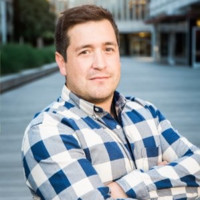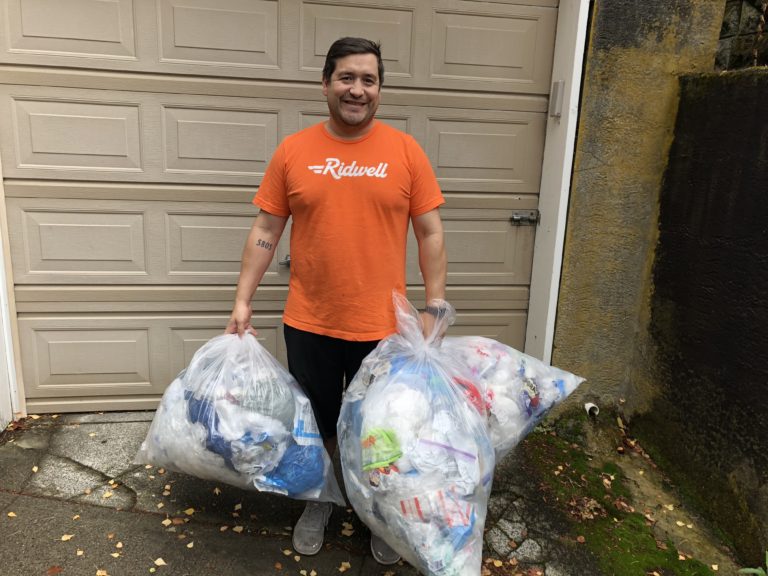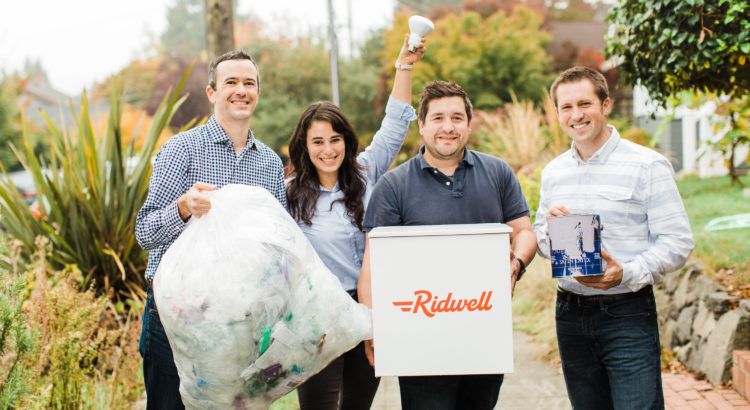Reduce, Reuse, Recycle, Ridwell: Catching up with Master of Science in Entrepreneurship alum Justin Gough
 Justin Gough is one of the co-founders of recycling and donation pickup service Ridwell and among the first to graduate from Foster’s Master of Science in Entrepreneurship program. Since graduating in June 2018, Justin’s company has experienced surprising growth. We recently caught up with Justin to discuss his life as an entrepreneur, Ridwell’s origin story, his experience in the MS in Entrepreneurship program, and more.
Justin Gough is one of the co-founders of recycling and donation pickup service Ridwell and among the first to graduate from Foster’s Master of Science in Entrepreneurship program. Since graduating in June 2018, Justin’s company has experienced surprising growth. We recently caught up with Justin to discuss his life as an entrepreneur, Ridwell’s origin story, his experience in the MS in Entrepreneurship program, and more.
The journey to the Master of Science in Entrepreneurship program
Justin’s entrepreneurial roots can be traced back to childhood, recalling a time when he “started buying soda from Costco in elementary school and selling it for more at lunchtime.” All the way through his undergraduate studies and beyond, Justin knew that he was not meant for the traditional, 9-5 office life.
Before beginning Foster’s Master of Science in Entrepreneurship program, Justin says he was “trying to make businesses happen.” He started small, trying everything from t-shirt printing to web development—even creating his own consulting company with a few employees. From there, Justin combined his web development skills with his on-demand logistics experience and started what he describes as an “Uber for package delivery for on-demand couriers.” To Justin’s delight, people actually used it.
“It worked,” Justin says. “People signed up. It was a lot of trying to figure things out. It was kind of the first foray into something that was tech related, and we were lucky enough, after 18 months, to sell the business. We had a few different offers, and it was an exciting, whirlwind ride.”
What drove Justin to look into pursuing higher education came while he was working on his second company.
“I kind of had an epiphany somewhere in the middle of that second company”, Justin says. “We were about to raise a little bit of money, and I just realized that I don’t know what I’m doing.”
Though he had considered pursuing an MBA, he wasn’t sure if it made sense for him as an entrepreneur. In a wonderful case of kismet, Justin describes “a serendipitous meeting” with MS in Entrepreneurship lecturer, mentor, and advisor TA McCann. McCann told Justin how an MS in Entrepreneurship graduate would stand out in a crowd of entrepreneurs.
“They understand that they don’t know what they’re doing,” says Justin recalling his conversation with TA. “And if they understand that they don’t know what they’re doing, they’re working to fix it. That’s someone that I want to work with.” After this chance meeting, Justin attended an information session for the MS in Entrepreneurship program and decided to apply. “I just knew that I have a lot of ideas,” says Justin. “I have no clue why some have worked and some were a colossal failure. And I wanted to be in a program that could help me make decisions faster.”

Justin collecting items for his company Ridwell
Life post-graduation
“Since graduation, life has been exciting,” says Justin. “I decided to take an idea that I was working on during the program, and we’ve turned it into a real business with paying customers.” The idea, a pick-up service for items such as batteries, light bulbs, and Styrofoam began with a father-son lesson on recycling. Justin’s friend Ryan was teaching his young son Owen how to recycle when they realized that many hard to recycle (but still recyclable) items were being thrown in the garbage. After Ryan recounted this story to Justin, they asked themselves, “Can we do the legwork of figuring out this hard thing?” The resulting legwork became Owen’s List (named after Ryan’s son), with thousands of Seattleites signing up to be part of the testing phase of the burgeoning service. Just months later (and no longer in test mode), Justin and his cofounders Ryan, Aliya, and David report that the business has “grown much faster than we expected” with them outgrowing their original warehouse space and doubling their service area. Justin notes that they have concrete plans to “expand to the entire city soon.”
Justin leads the company’s operations and logistics efforts, overseeing Ridwell’s day to day operations and managing relationships with their recycling partners. He also shares customer support duties with his three co-founders. When asked how he’s applying what he learned in the program to Ridwell, Justin says, “Every day a problem shows itself, and having the ability to think through that business problem with a background in research and in the actual scientific part of entrepreneurship… before the program, I probably would’ve just guessed. And now there’s still a lot of guessing, but it’s based in some background.”
Justin says being part of a community of entrepreneurs has also been helpful. “Having the outlets and a network of people in the Seattle area that I can turn to is invaluable,” says Justin. “Whether it was mentors that we met along the way or professors that are obviously highly skilled in every one of their fields–I feel like having those tools in my toolkit are worth 10 times the amount we paid in tuition.”

Ridwell founders from left to right: Ryan Metzger, Aliya Marder, Justin Gough, and David Dawson
Reflecting on the MS in Entrepreneurship experience
For Justin, every MS in Entrepreneurship class provided a chance to learn something new and exciting. “As someone that was an entrepreneur wandering around the dark, every class opened my mind to something,” says Justin.
He particularly loved the quarterly Entrepreneurship Leadership courses taught by Foster Lecturer of Leadership, Technology, and Commercialization Ken Myer. Every quarter, the class leads students through the different problems they might encounter while leading a company.
“It’s probably the one class I walked out of every time with my mind being blown,” says Justin. He remembers thinking, “That’s how you deal with that thing? Or where was this five years ago when I encountered this exact same problem?”
The program also provided Justin with his first Harvard Business Review (HBR) Case Study, an experience that Justin says was both eye-opening and humbling. “As someone that had never heard of an HBR case before, [I had] no clue what was going on. But I remember reading it and specifically knowing exactly what the entrepreneur should do. And needless to say, I was 100% wrong.”
In addition to the classes, Justin credits his classmates with providing such a great program experience. “No one knew each other,” remembers Justin. “We were just very cordial and friendly and said hi to everyone, but you didn’t know anyone. And then you fast forward to graduation. I think all of us were a little bit sad because it was over.”
Three questions on entrepreneurship
Before our time with Justin was over, we asked him to share his thoughts on what it means to be an entrepreneur, the benefits of being an entrepreneur, and advice for people just getting started. See his answer’s below:
What is an entrepreneur?
“I think you’re not an entrepreneur until you sell something to somebody. I think there’s a lot of people that want to be entrepreneurs, that have ideas, but until you build something — whether it’s a technical product, a website, a service — until someone’s willing to exchange, it doesn’t have to be money but exchange something for your service, then I don’t think you’re an entrepreneur. The people that created Facebook and Snapchat, they didn’t sell anything early on, but you exchanged your email address and your time for their product. And once you do that, once you convince people that your idea is good, I think you’re an entrepreneur. I also think that once you figure out that an idea is bad, you’re also an entrepreneur. You don’t need to sell it. You just need to have the drive to create something and put yourself on the line and ask people, “Hey, do you want this thing?””
What are the advantages of entrepreneurship?
“I think the advantage of being an entrepreneur is having the ability to reverse engineer anything.”
What is the best advice for first time entrepreneurs?
“Don’t fall in love with your idea because it’s probably not good. And even if it is a good idea, it’ll look nothing like what you think it’s going to look like.”
Follow Ridwell on Facebook, Twitter, and Instagram for more information about the company.
